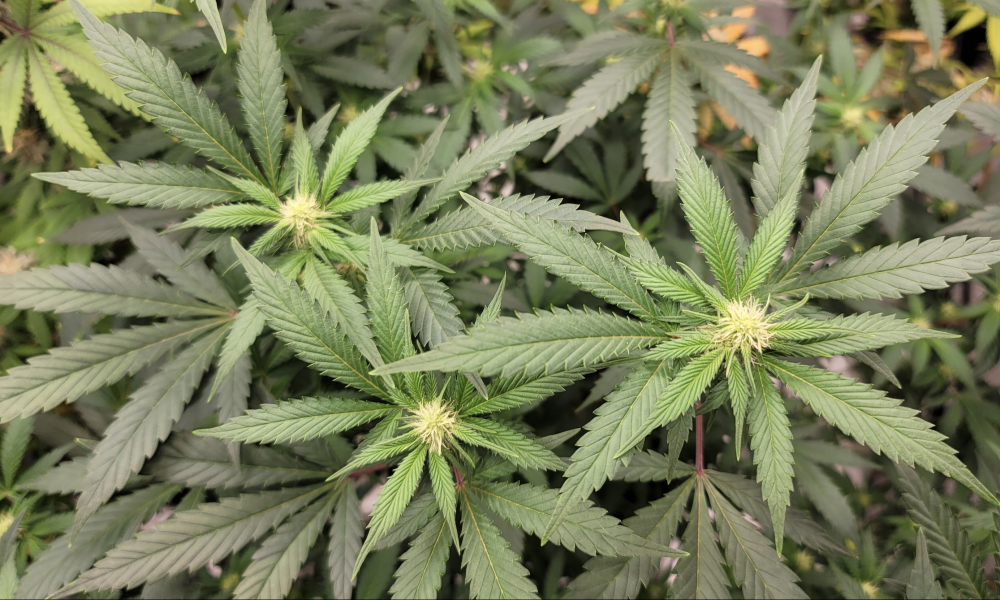A coalition of 10 civil rights and drug policy reform advocacy groups—including the Rhode Island chapters of the ACLU and NAACP—are demanding that lawmakers move ahead with enacting marijuana legalization in the state before the end of 2021.
Meanwhile, the lead sponsors of competing House and Senate legalization bills told Marijuana Moment on Tuesday that conversations about working out the differences between their proposals and a separate one proposed by the governor are going well.
In a statement released by the coalition Yes We Cannabis RI on Tuesday, activists said they are “urging lawmakers to reach a deal to equitably legalize cannabis for adults in a special legislative session tentatively slated for this fall.”
“The war on cannabis has gone on long enough. Tens of thousands of Rhode Island residents, disproportionately people of color, bear the weight of a criminal record for something that is now legal in both Connecticut and Massachusetts. It is time to stop the harm and repair the damage that has been done here in our state. We urge members of the General Assembly to find common ground and move forward with a plan to equitably legalize cannabis in a special legislative session this year.”
House Speaker Joe Shekarchi (D) said in July that while there’s not yet a consensus among legislators and the governor on a deal to legalize marijuana, it’s still a “workable” issue and would be prioritized if negotiations succeed this summer and a special session is convened this fall.
“I think it’s going well,” Senate Health & Human Services Chairman Josh Miller (D), who authored a marijuana legalization bill passed by the Senate in June, told Marijuana Moment of the ongoing negotiations on Tuesday.
Rep. Scott Slater (D), for his part, said “things are still where they were” prior to the end of session. Lawmakers are “trying to figure out a reconciliation between my bill, the Senate’s and the governor’s.”
Meetings over the summer have been “mostly informal” so far, the representative said. “I think we can get there before next year. It will not be perfect, and I am sure a work in progress.”
And while members are “still trying to work out number of retail [licenses], governance, cultivation and social equity,” Slater said he believes they can reach a deal “because at least the majority of leadership agrees that there should be adult recreational cannabis.”
In a press release about the new coalition statement, Yes We Cannabis RI cited polling that shows a strong majority of Americans favor ending cannabis prohibition and expunging prior marijuana convictions. In addition to NAACP Providence and American Civil Liberties Union of Rhode Island, signatories also include the Marijuana Policy Project, Black Lives Matter RI PAC, Reclaim RI, Rhode Island Cultivator Industry Association, Formerly Incarcerated Union of RI, Garden Time, Protect Families First and Substance Use Policy Education and Recovery PAC.
Senate President Dominick Ruggerio (D) said in July that he’s not disappointed the House hasn’t advanced legalization legislation yet and that “what we really wanted to do was send it over and have them take a look at it” when his chamber passed its cannabis reform measure.
—
Marijuana Moment is already tracking more than 1,200 cannabis, psychedelics and drug policy bills in state legislatures and Congress this year. Patreon supporters pledging at least $25/month get access to our interactive maps, charts and hearing calendar so they don’t miss any developments.![]()
Learn more about our marijuana bill tracker and become a supporter on Patreon to get access.
—
Shekarchi, for his part, previously said that he feels reform is “inevitable.”
A key disagreement between the House, Senate and governor’s office concerns who should have regulatory authority over marijuana. Ruggerio was pressed on the issue during a recent interview and said members of his chamber agree that “a separate commission is the way to go with respect to this.”
The House and Gov. Dan McKee (D), on the other hand, want the program to be managed by the state Department of Business Regulation (DBR). Ruggerio noted that “it was difficult to negotiate on a bill when the House bill really didn’t come until late in the session.”
Senate Majority Leader Mike McCaffrey (D) was also recently asked about provisions related to allowing local municipalities to opt out of allowing marijuana businesses to operate in their area. He said “once the legislation is passed and whatever form is passed in, the communities have an opportunity to opt out.”
“They have an opportunity to opt out if the community doesn’t want to participate in it,” he said. “That’s their decision—however, they don’t get the funds that would come from the sales in that community.”
The majority leader also noted that neighboring states like Connecticut and Massachusetts have enacted legalization, and that adds impetus for the legislature to pursue reform in the state.
Shekarchi, meanwhile, said in July that he doesn’t intend to let regional pressure dictate the timeline for when Rhode Island enacts a policy change. Social equity, licensing fees, labor agreements and home grow provisions are among the outstanding matters that need to be addressed, the speaker said.
The state Senate in June approved a legalization bill from McCaffrey and Miller, which was introduced in March. The governor also came out with his own legalization proposal shortly thereafter.
The House Finance Committee held a hearing on Slater’s legalization measure in June.
The governor, for his part, told reporters that while he backs legalization it is “not like one of my highest priorities,” adding that “we’re not in a race with Connecticut or Massachusetts on this issue.”
“I think we need to get it right,” he said, pointing to ongoing discussions with the House and Senate.
The House Finance Committee discussed the governor’s proposal to end prohibition at an earlier hearing in April.
Both the governor and the leaders’ legalization plans are notably different than the proposal that former Gov. Gina Raimondo (D) had included in her budget last year. Prior to leaving office to join the Biden administration as commerce secretary, she called for legalization through a state-run model.
McKee gave initial insights into his perspective on the reform in January, saying that “it’s time that [legalization] happens” and that he’s “more leaning towards an entrepreneurial strategy there to let that roll that way.”
Shekarchi, meanwhile, has said he’s “absolutely” open to the idea of cannabis legalization and also leans toward privatization.
Late last year, the Senate Finance Committee began preliminary consideration of legalization in preparation for the 2021 session, with lawmakers generally accepting the reform as an inevitability. “I certainly do think we’ll act on the issue, whether it’s more private or more state,” Sen. Ryan Pearson (D), who now serves as the panel’s chairman, said at the time.
Meanwhile, the governor in July signed a historic bill to allow safe consumption sites where people could use illicit drugs under medical supervision and receive resources to enter treatment. Harm reduction advocates say this would prevent overdose deaths and help de-stigmatize substance misuse. Rhode Island is the first state to allow the facilities.
The Senate Judiciary Committee also held a hearing in March on legislation that would end criminal penalties for possessing small amounts of drugs and replace them with a $100 fine.
Top Mexican Senator Says Lawmakers Will Again Take Up Marijuana Legalization In New Session
Photo courtesy of Mike Latimer.
Medical Disclaimer:
The information provided in these blog posts is intended for general informational and educational purposes only. It is not a substitute for professional medical advice, diagnosis, or treatment. Always seek the advice of your physician or other qualified healthcare provider with any questions you may have regarding a medical condition. The use of any information provided in these blog posts is solely at your own risk. The authors and the website do not recommend or endorse any specific products, treatments, or procedures mentioned. Reliance on any information in these blog posts is solely at your own discretion.







